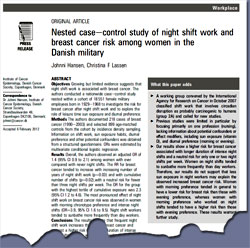Advice Needed So Employers Can Reduce Risk Of Female Workers Developing Breast Cancer
Whilst the TUC is calling for support for employers with regard to the evidence collected confirming what has long been feared, that shift work increases the risks to women of breast cancer; the chances of british industry actually accepting that there is any link between cancer and shift work is far greater than David Cameron seeing the light and becoming a Labour Party MP!
Scientists, trade unions and medical professionals have all raised their concerns about the efefct that shift working has on the human body, and a new report out this month appears to provide evidence that this is indeed the case.
 Commenting on a study published on 29th May, on the Occupational and Environmental Medicine website, which found that frequent night shifts are linked to an increased risk of breast cancer, TUC General Secretary Brendan Barber said:
Commenting on a study published on 29th May, on the Occupational and Environmental Medicine website, which found that frequent night shifts are linked to an increased risk of breast cancer, TUC General Secretary Brendan Barber said:
"This study confirms previous research which has shown that shift work is now the second biggest cause of work-related cancer deaths after asbestos.
We need urgent advice from the HSE and government so that employers can reduce the risk of female workers developing breast cancer, for example by indentifying safer shift patterns."
The study was reviewed and reported on the Breastcancer.org website, following publication online May 29, 2012 in Occupational and Environmental Medicine's website:
The researchers surveyed 18,551 women born between 1929 and 1958 and reviewed their work histories. All the women worked in some way for the Danish military between 1964 and 1999. All the women were 75 or younger when they completed the questionnaire. From this information, the researchers calculated how much day shift vs. night shift work the women did.
Using a cancer database -- the Danish Cancer Registry -- the researchers determined which women had been diagnosed with breast cancer. They then looked for links between the women’s shift work history and their risk of being diagnosed with breast cancer.
Overall, women who had worked night shifts were 40% more likely to be diagnosed with breast cancer compared to women who never worked night shifts.
Breast cancer risk increased the most in women who frequently (or always) worked night shifts for a long time. For these women, breast cancer risk was more than doubled compared to women who never worked night shifts.
On the other hand, women who worked one or two night shifts per week for fewer than 6 years had the same breast cancer risk as women who never worked night shifts.
Doctors aren’t sure what’s causing the link between regular night shift work and breast cancer risk. Some doctors think that lower levels of melatonin, a hormone made in the brain, could explain the higher risk. Melatonin plays a role in regulating the body’s sleep cycle and may also help regulate cell growth and repair. People who don’t sleep at night (when it’s dark outside) tend to have lower melatonin levels. Lower melatonin levels may lead to patterns of breast cell growth and repair that make breast cancer more likely to develop.
Some doctors think the higher breast cancer risk seen in night shift workers may be related to lifestyle factors. For example, some research has found that obesity, smoking, and drinking alcohol -- all of which have been linked to higher breast cancer risk -- are more common in women who work night shifts.
In our 24-hour world, many people have no choice but to work night shifts; not working night shifts to minimize breast cancer risk isn’t a realistic option for many women. For these women, the possible link between breast cancer risk and night shift work makes it more important to make other lifestyle changes -- eating a healthy diet, exercising, not smoking, avoiding alcohol -- that can decrease breast cancer risk.
Download the full report from the E-Library Database Choose category of 'Cancer(work related)' or use keywords 'breast cancer'.
Source: TUC / Breastcancer.org / Occupational and Environmental Medicine


